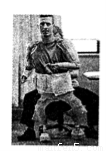题目内容

Matthew Ames returned to Brisbane from Melbourne at the weekend after experiencing one of many rounds of surgery,becoming Australia’s first bionic(仿生学的)man. Matthew Ames was at home on Monday morning,adjusting to national media attention and life with titanium rods(钦杆)in what remains of his arms and legs.If all goes to plan,later in the year he will have more surgery to fix bionic prosthetics(假肢).
????? It all started 15 months ago,when the Origin Energy engineer一who lives with his wife Diane and four children in Camp Hill in Brisbane’s east一began feeling like he was coming down with the“man flu”,A week later he was in hospital,senseless and on life support,which was caused by a deadly form of bacteria.
????? “He had a. 99%chance of dying,”Matthew’s son Luke,9,said in a program,Sunday Night which drew more than 2.12 million viewers nationally.
??? Matthew’s younger sons Ben,8,and Will,7,added:“And only 1%of living.”
??? Proudly Will concluded:“And the 1% won against the 99.”
??? Matthew’s families were told Matthew’s only chance of survival was to have his four limbs removed.For Diane,the choice was easy.She could not allow their children to grow up without a father.Eventually,Matthew came to,only to find he had no arms and legs.
??? On Monday,he is attending a Pride of Australia Medal ceremony for which he has been nominated(被提名)In the courage category.“The 40-year-old is slowly getting used to a few more people knowing about his story,”his sister Kate told Fairfax Media.“We told his story so that he was known to the kids,and thus people wouldn’t stop and stare,”Kate continued.“We’re not sure what to expect now that his story has aired across Australia.The effect it would have in a positive way on people is beyond our expectation.”
1.From the first two paragraphs we can learn that Matthew Ames
A.has finished all of his operations
B.is the first bionic man in the world
C.is becoming the focus of the public
D. had his arms and legs cut completely
2.From what Matthew Ames’sons say,we can conclude that
A.it was a wonder for their father to escape from death
B.most doctors refused to operate on their father
C.the sons’love is the cure of their father,s disease
D.the sons’pray moved God and saved their father
3.What was the attitude of Matthew’s wife when he was advised to cut his legs and arms?
A. Doubtful. B. Supportive. C. Cautious. D. Casual.
4.What would be the best title for the passage?
A. A Lucky Father B. A Bionic Man
C.A National Hero D'. A Reliable Husband
1.C
2.A
3.B
4.B
【解析】
试题分析: 本文介绍了Matthew Ames, 他在患病后生命垂危,活下来的可能性只有百分之一,为了保住他的生命,他的妻子毅然 作出为他截肢的决定,就这样他成了澳大利亚第一个bionic man,他的病情受到了人们的广泛关注。
1.C细节理解题。根据Matthew Ames was at home on Monday morning,adjustingto national media attention可以判断Matthew Ames受到了大众和媒体的关注,其余选项内容错误,故答案选C。
2.A推理判断题。根据Matthew Ames 的儿子Luke说的话,“lle had a. 99%chance of dying,”“And only 1%of living.” “And the 1% won against the 99.”可以判断Matthew Ames生命垂危,能够活下来是一个奇迹,所以A选项正确。
3.B细节理解题。A怀疑的;B支持的;C小心的;D随意的。根据文章倒数第二段For Diane,the choice was easy.She could not allow their children to grow up without afather.Eventually,Matthew came to,only to find he had no arms and legs.可以判断为了让Matthew能够活下来,他的妻子赞同医生给他截肢,答案选B。
4.B主旨大意题。文章采用倒序的写作手法介绍了截肢后受人们关注的第一个bionic man,即Matthew Ames,然后在下文中对整个事情进行讲述,由此判断B选项更能体现文章中心,答案选B。
考点:考查故事类短文阅读。

 期末好成绩系列答案
期末好成绩系列答案 99加1领先期末特训卷系列答案
99加1领先期末特训卷系列答案 百强名校期末冲刺100分系列答案
百强名校期末冲刺100分系列答案 好成绩1加1期末冲刺100分系列答案
好成绩1加1期末冲刺100分系列答案 金状元绩优好卷系列答案
金状元绩优好卷系列答案